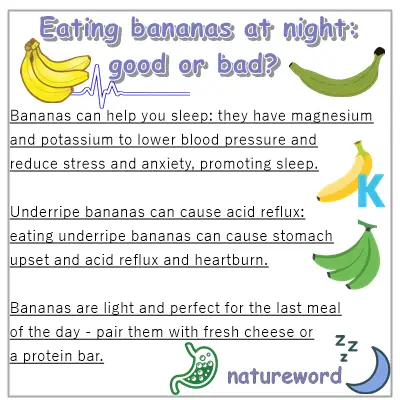Have you ever wondered what happens in your body when you eat bananas at night? There are many benefits to eating bananas, but also side effects. Some people respond better to the fruit than others, while some are more sensitive to bananas in general. Some people can’t eat bananas at all at certain ripening stages, or tolerate more than one fruit at a time. And some tolerate a higher intake, and fruits that are both underripe and overripe. Context matters, especially when it comes to eating bananas at night, before bedtime.
For example, eating bananas at night can cause acid reflux in some people, and disturb their sleep as a result. Green bananas can cause an upset stomach and stomach pain. Overly ripe and sweet bananas may be too energizing for some people and cause them to forego sleep which can negatively impact their routine the following day. Eating bananas too close to bed time, or late at night, is more likely to cause side effects than eating them two or three hours before bed. Similarly, eating too many bananas at night can also cause side effects, as opposed to just one fruit a few hours before going to sleep.

Benefits: Bananas are good for sleep
Eating bananas at night can help you sleep better. Bananas are a natural source of potassium and magnesium. Potassium and magnesium lower blood pressure numbers which creates a state of relaxation that is conducive to sleep.
Magnesium also has direct effects on the nervous system, reducing agitation, stress and anxiety and inducing calm. Both magnesium and potassium in bananas help relax muscles and relieve tension in muscles, actively contributing to a more restful sleep.
Bananas are also naturally high in vitamin B6 which is involved in serotonin production – serotonin is a neurotransmitter that helps boost mood and reduce anxiety, favoring sleep. Vitamin B6 is also involved in the production of GABA, or gamma-Aminobutyric acid, which is a neurotransmitter with an inhibitory effect on the nervous system. GABA reduces excitability of neurons throughout the nervous system which can have a positive effect on sleep. The neurotransmitter is also more distantly involved in the production of a precursor to melatonin, from serotonin, which helps regulate circadian rhythms, with benefits for sleep.
Side effects: Insomnia
Eating bananas at night can cause insomnia. The reasons why bananas cause insomnia vary from person to person and include:
- Eating bananas too close to bedtime
If you eat bananas, or anything really, too close to bedtime, you risk acid reflux at night. Acid reflux at night can cause you to wake up from your sleep with heartburn, sweating, palpitations or coughing. Acid reflux at night is more likely in people with active acid reflux disease that is not being managed with dietary changes, and/or medication.
- Eating bananas that are too unripe
Some people are more sensitive to fiber in fruits and vegetables, either just some types of dietary fiber, or fiber in general. And unripe and underripe bananas, and other fruits, have the most potential to cause digestive upset because of their fiber content and profile. Eating unripe or underripe bananas at night can easily work up the stomach and negatively impact sleep.
- Eating too many bananas
An excessive intake of the fruit at dinner or dessert can cause indigestion with burping, bloating, stomach cramps, gas, heartburn and regurgitation of stomach juices which can delay falling asleep or cause you to wake up several times during the night, disrupting sleep quality.
- The sugars in bananas energize you
Bananas have over 12 g of sugar per 100 g. So if you have two small bananas at night, you are getting anywhere between 12 to 25 g of sugar (a banana at 50 g can be considered small, and so can one at 100 g). Naturally, your blood sugar levels will rise, and you will feel energized. Some people will enjoy a sense of calm and satisfaction and tuck themselves into bed, but others may delay going to sleep as they just feel energized from eating the fruit.

Benefits: Bananas are easily digestible
Ripe and overripe bananas, especially true dessert bananas, are fairly easy to digest in the sense that they get digested easily and don’t make you feel too full or bloated or in any way heavy. If you are looking for something to eat at night, whether dinner or a snack, that is easy on the stomach, then you can consider one small or medium ripe dessert banana. Bananas that are easiest to digest are golden yellow all over, or with various degrees of brown spots.
Side effects: Bananas can cause stomach upset
At the same time, eating bananas at night can cause stomach upset in some people. For the most part, it’s underripe bananas, or eating too many bananas. Symptoms of stomach upset may include: stomach hurt, bloating, burping, regurgitation of stomach juices and heartburn, stomach cramps and gas, among other side effects. Also, eating too many bananas, especially unripe ones, can cause constipation in some people which is another side effect to look forward the following day.
Benefits: Bananas are satiating, but light
One of the biggest benefits of eating bananas at night is the fact that they are satiating, but light at the same time. That is, you do feel fed after eating two small bananas at night, or one medium to large banana. And, at the same time, you don’t feel too full or heavy as bananas are fruit and fruit get digested faster than animal foods or complex meals, especially at night when the level of physical activity decreases significantly for many people.
If intakes are reasonable, in line with individual nutritional requirements, then eating bananas at night won’t make you gain weight – in fact, eating bananas can even help you lose some weight.
Healthy and light dinner ideas that include bananas:
- 1 medium banana and 1 protein bar
- 1 medium banana and 200 g of fresh cow milk’s cheese, cottage cheese or fresh mozzarella
- a shake made from 2 small bananas with 200-300 ml of dairy or non-dairy milk
Side effects: Bananas can leave you feeling hungry
When it comes to nutrition, there are two big rules. One: not all people respond the same way to the same foods. Two: your body will generally be satisfied with what it gets on a regular basis.
So if, for example, you’re not the kind of person that eat fruits regularly, daily even, then you stand higher chances of feeling physiologically unsatisfied when you do eat them, and are more likely to experience side effects.
The same thing can be said for dairy milk: if you stop drinking dairy milk, you will become intolerant in a few short years, registering significant discomfort and issues digesting milk when you do have it. So if you are used to having animal protein at dinner time to feel satiated and satisfied, then eating a banana, or any other fruit, or even vegetables without animal protein will leave you hungry and unsatisfied. And hunger is problematic because it can prevent you from falling asleep and cause you to raid the fridge, filling up to the point of a stomachache.
